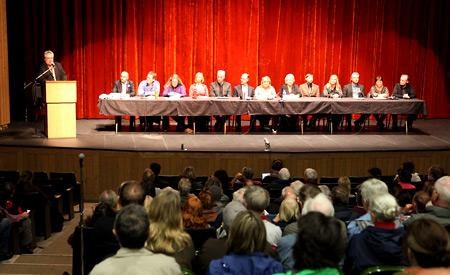Sewage, incineration, the economy and the new Powell River Public Library were issues on the minds of citizens posing direct questions to City of Powell River Council candidates at an all-candidates forum.
About 300 people attended the forum sponsored by Powell River Chamber of Commerce, held in Evergreen Theatre at Powell River Recreation Complex.
Moderator Dan Devita introduced the 13 candidates running for six councillor positions: incumbents Jim Palm, Russell Brewer, Debbie Dee, Maggie Hathaway and Myrna Leishman, along with aspirants Karen Skadsheim, Dave Dickson, Rob Southcott, William Ashworth, Carole Ann Leishman, Jim Baron, Anita Adams and Ron Ostensen.
The forum format provided each candidate two-minute opening and closing statements. The bulk of the time was spent responding to seven questions posed by members of the audience:
• Are you in favour of sewage going to Catalyst Paper Corporation?
• Do you support continued funding for arts and culture?
• Would you support development and implementation of a social planning committee at city hall?
• If the library referendum fails, would you revisit Willingdon South as a location for the library?
• What are your ideas for creating a local economy that is diverse, ethical and ecologically sustainable?
• If you could place your energy and passion behind only one project or idea in Powell River, what would it be?
• Are you in favour of incinerating solid waste?
All candidates agreed upon continued support for arts and culture. Regarding establishment of a city social planning function, all panelists gave assent to the prospect. For a library at Willingdon South, there was an array of answers but in the end all agreed the location is off the table.
Opinion was split on treatment of city liquid waste at the Catalyst treatment facility. Ostensen’s response was a “very definite maybe.” Baron said it would give time to get organized and save money for a standalone facility.
Myrna said she was still waiting for all of the information to come in. “It’s not a rash decision that can be made.” Hathaway said she agreed with Myrna. If funding can be raised for an innovative co-treatment project, she’s in support, but otherwise, she’s in support of a standalone facility. Dee said it was more than a yes or no answer. “It’s not handing over public services to a private corporation,” she said. “It’s way more complicated than that.” Palm agreed with Dee, saying the issue was more complicated than a yes or no answer. “We don’t have the answers we need to make an informed decision.”
All of the other candidates were opposed to co-treatment at the mill.
Regarding the incineration of solid waste, most candidates were strongly opposed.
Ashworth was in favour. He said that incinerating waste could be just as clean as transporting it to Washington State and would cost a lot less.
Hathaway said it would have to be something really new and innovative before she’d agree to incineration.
In terms of local economy, Baron was in favour of food production and repurposing waste products, such as the sheepskin tannery project. Carole Ann was also in favour of initiatives such as the tannery, plus small business development. Ashworth advocated incentives for local farmers. Myrna agreed with Carole Ann’s priorities.
Hathaway said she is supportive of the type of initiatives that were revealed in the recent news conference on businesses being attracted to Powell River. Southcott said sustainability is important in any economic considerations, plus supporting projects that bring value to Powell River.
Dickson favoured educational opportunities, such as an independent university in Powell River. Skadsheim was also in favour of turning Powell River into a university town and ensuring that students have opportunities to continue studies here.
Dee was in favour of selling Powell River outside of the community and creating a niche university for arts and culture.
Brewer believed in leveraging forest resources, expansion of new energy initiates such as wind, solar and geo-thermal, plus increasing local food production.
Palm advocated job expansion, using entrepreneurial skills to attract business.
Ostensen wants a “say yes” to business attitude at city hall and Adams is a supporter of agricultural initiatives, such as growing hops.



